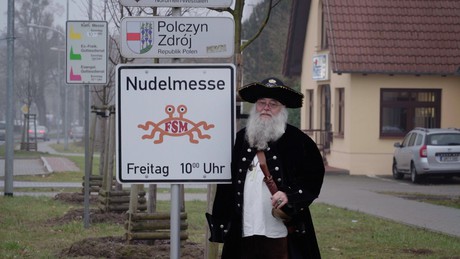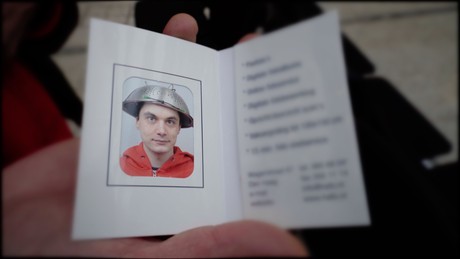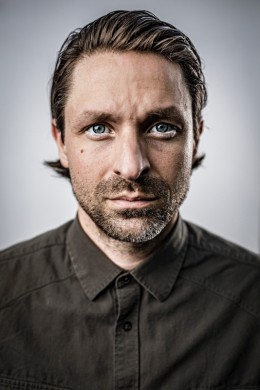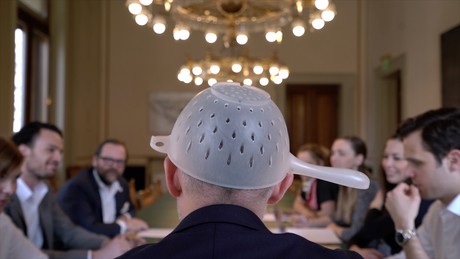Howdy, y’all! McEric here with news about a documentary released digitally today called I, PASTAFARI by Michael Arthur. Check out the trailer:
I, PASTAFARI is an examination of the Church of the Flying Spaghetti Monster and its followers’ fights for religious equality in several court cases in Europe over a few years beginning in 2016. For the uninitiated, The Church of the Flying Spaghetti Monster began in 2005 quite ironically, when Bobby Henderson sent an Open Letter to the Kansas School Board in response to an ongoing legal battle to incorporate Creationism, or Intelligent Design, into Science classes across the state. Henderson endeavored to point out the hypocrisy of allowing a faith-based deity to be prescribed science by establishing a new deity: The Flying Spaghetti Monster, which created the Universe only a few thousand years ago, despite evidence that the earth is several billions of years old. The Flying Spaghetti Monster did this deliberately, to “trick” scientists, and Henderson goes on to note that Global Warming has increased while the presence of Pirates has decreased and draws a direct line between those phenomena. As any college student knows, this is a hasty generalization and is one of the more prominent logical fallacies, and that’s all part of his game. Henderson’s intent was to lampoon religion to spur critical thinking, to light the hypocrisy in Kansas’s court system at the time. The irony is that his funny little liturgy caught fire, and the Church of the Spaghetti Monster is now a worldwide movement with millions of followers.
And why not? The Gospel of the Flying Spaghetti Monster (yes, that’s a thing) has great lessons about human decency, inclusivity, and general wellness as a community. Rather than Commandments, it posits “I’d Rather You Didn’ts,” which range from not building mega-churches to not invoking the Flying Spaghetti Monster’s name if all you’re planning to do is be an obstinate dick about something. It’s full of humor but mostly compassion. As far as religious dogma goes, it’s fairly reasonable and objectively superior to some of our more archaic texts.

However, the road to religious legitimacy for those members of the Church of the Flying Spaghetti Monster, or Pastafarians, as they call themselves, has been a rocky one worldwide. The religious freedoms afforded to those who follow more “traditional” faiths seem to elude the Pastafarians. Indeed, it is Henderson’s parodic origins that have stalled legitimacy claims in courts since well-meaning people have chosen to adopt the liturgy as their own faith. But why should parody dismiss the value in something? I personally stand by my claim that HOT SHOTS is a better film than TOP GUN.
Filmmaker Michael Arthur had seen the glaring dissimilarities in religious freedoms and the gross negligence in separating church and state in America and abroad, and saw the message the Pastafarians have been yearning to teach us: that the absurdity of these debates must be seen clear, and once we have all had our eyes opened we can move away toward a better understanding of our sense of human community.
The most visible aspect of this debate of religious legitimacy came in the form of state-issued identification cards and the freedom to wear a headdress for religious expression therein. Whereas Henderson stated that the preferred garb of the faithful be that of pirate regalia, many worshippers of His Holy Noodliness have adopted wearing colanders on their heads (as one would a yarmulke or hijab) as their religious expression. Governments have pushed back on this allowance, noting the appearance to be silly or unbecoming, but it asks the larger question: who decides what is legitimate in matters of faith?

Through interviews, court proceedings, historical documents, and an examination of its gospel, Michael Arthur provides a thought-provoking, conversation-starting look into the Pastafarian movement, and their celebration of critical thinking. This movie will make you think, make you want to learn more, and, through some pretty tantalizing pasta photography, hungry.
I got the chance to chat with Michael last week about his film and I even tried to offer some pointers for the Pastafarians on their quest for legitimacy, from my own armchair philosopher’s post.

Michael Arthur: Hey, Eric.
Eric McClanahan: Hey, Mike! How are you today?
MA: I’m doing great, man. I’m looking forward to chatting with you.
EM: Excellent! So I watched I, PASTAFARI and I guess the biggest question right at the top of my list is “What made you decide to make this film?”
MA: Yeah, that’s a good question, because it’s not a typical film, for sure. There are many reasons behind why I wanted to make it but I think what it really comes down to is that I just got tired of seeing these unproductive debates about the impact of religion in society today. They always end with either frustration or anger or someone just saying “You just gotta have faith!” And, meanwhile, every day we see headlines about religion being used as justification to discriminate, resort to violence, or to spread anti-science nonsense, all while getting tax deductions to do so. I think what the Pastafarians are trying to say is “Okay, if we’re not going to talk about this like rational adults, then let’s try another method.” And, I don’t know, I feel as though, with the temperature of society today, we don’t really talk to each other. We kind of prescribe to two different means and we have our own reality, I thought that maybe the Pastafarians might be able to trick a few people into critically thinking for themselves. So that’s kind of, in a nutshell, the motivation for making a film like this.
EM: So you appreciate that they’re getting people to ask questions, they’re getting the conversation started about religious equality, and the separation of church and state. So would you say you support the Pastafarians?
MA: Yeah, I think so. I support what they’re trying to do. But I’d also say that it’s really a shame that we have to try different methods, these particular methods, to talk about this. I wish we could just sit down and have a real, rational debate about this idea of religious freedom. Because in the U.S., where I live now (I lived in Europe when I made the film, and I’m back in the U.S. now) what religious freedom is a lot of times is taken as “I’m free to do whatever I want because my religion says so.” You know what I mean? And anytime you try to have a debate about that, it breaks down. So, yes, I would much rather prefer a rational debate about these issues; you know, reasonable people discussing reasonable solutions? But that doesn’t seem to be an option with religion; it’s either off the table, like we just can’t talk about this, or it just causes conflict. There has to be a better way. I haven’t found a way, yet, so I thought that maybe this way could work. The humor would have a good way to break through the tension.
EM: It seems humor, sadly, is one of the things holding that faith back from legitimacy. That notion kept coming up of a seriousness that needs applied to religion in court.
MA: Yeah, totally. I mean, and that was kind of a main thing of the film: that while humor is a major tenet of their faith, the humor is used in a unique way to deliver a very important message. So in court cases, in Europe, anyway, the humor has been the issue that they haven’t been able to get over. But it hasn’t been argued well, in my opinion. I felt, when I filmed the trial, I didn’t expect the Pastafarians to win; I knew it was an uphill battle. But I also felt like they weren’t really trying to win. That’s my interpretation as a filmmaker. The Pastafarian community is just as diverse as any other community: people have different motivations, people have different goals, some people just think it’s funny. They share memes and it’s great, for them. But they weren’t really trying to win, they were trying to make a point, which is “Who decides what a real religion is?” If you’re going to say, okay, Pastafarianism isn’t a real religion. Okay, then why not? Do they have millions of followers worldwide? Yes. Do they have a book? Yes. Within that book, do they have stories that teach moral lessons? Yes. Do they have cultural traditions and rituals that they practice with a community of like-minded people? Yes. Is it old? How old? [laughs] Like, what’s the cutoff? The Mormon Church is 200 years old, Scientology is 50 years old, and Pastafarianism is fifteen years old. So what’s the cutoff? The main point was, if there’s all this grayness in “what is a religion?” then why does whether believing in Thor or the Flying Spaghetti Monster or God impact your rights? That’s really the motivation, I think, behind what they’re doing.
EM: There’s an irony that this has to play out IN court when the idea is that we’re to be separating religion from law.
MA: Yes, exactly! But we’re not! And that’s kind of the point. The Netherlands is a secular state; they have religious freedom enshrined in their constitution. The United States created the separation of church and state and yet we somehow are the worst at it. That’s one of the reasons that Pastafarianism was created here. No country has failed more than the U.S. at separation of church and state and equality, for that matter.
EM: I did find it ironic that for a religion originating in the United States, in Kansas, of all places, there wasn’t a lot of representation of the United States in the film. Was that just a travel issue?
MA: Yeah, I lived in the Netherlands and I found out there was a trial in the Netherlands after doing a little bit of research, and in the Netherlands you can film trials. I have to tell this story visually and these trials I thought were the best way to do it. So part of it was, yes, I was living in Europe and it was easy to take a train to Austria, Germany, etc. This isn’t a big budget, studio film; it’s entirely paid for through crowd funding and my dwindling savings account. So that’s the main motivation. If I could’ve found a financier to get a million dollars to make the film I probably would’ve traveled to some other countries. I would’ve happily done this with a higher budget but that wasn’t an option, so I did the best with what I could. Really, that’s the life of an indie filmmaker, right?

EM: Yeah, absolutely. Another thing I noticed in the film that you didn’t touch on was some of this other recent religions’ journey towards legitimacy and comparing theirs to the Pastafarians’ journey.
MA: Yeah, this film has shifted over the three years that I’ve made it, as many documentaries do because there’s no script; you kind of follow where the film takes you. This film at one time was much longer and tackled a bigger host of issues, but when I was reviewing that cut it felt like I was kind of all over the place and I wasn’t doing one thing well. You know what I mean? So I narrowed it down. And at the same time, after a year or two of working on the film, I saw a trailer for HAIL, SATAN. [laughs] I was like, “Shit.” I also think, honestly, this whole idea of a “real religion…” I’m asking is it possible to disprove or differentiate between a real and a fake religion? But if you compare Pastafarianism to something like Jediism, Pastafarianism is a lot more deep and lot more profound. I feel like they’re going after different issues and I personally feel that what the Pastafarians are all about is much more relevant today than some of these other new religions. But that is a different movie and I think that it should be made. It helps us to group in Pastafarianism, or any of these religions with the rest of them, because a lot of them are so unique. Like Jediism doesn’t have a god, for example; they just worship the gospel of Star Wars. There were a lot of different avenues I could’ve taken for this film, and that’s what I ultimately chose. Plus, there’s not a lot of films about Pastafarianism so I thought it’d be a unique film to make.
EM: Yeah, that’s why when it came across my desk I said “Yes, I want to watch that! Absolutely!”
MA: Yeah, I know!
EM: My wife and I were talking about this after I watched the film; it’s a great conversation starter. Whenever someone would express that they worshipped the Church of the Flying Spaghetti Monster, you would see the person that they were communicating with shut down immediately upon hearing “Flying Spaghetti Monster.” Have they considered giving the deity a name?
MA: Honestly, I don’t know.
EM: I wonder if it would change the legitimacy of the conversation if they had a Gaia, or Allah, or-
MA: Yeah, but that kind of defeats the purpose, because people will come up and say “These stories are ridiculous and unbelievable. It’s unbelievable that a Flying Spaghetti Monster could create the Universe.” But how more unbelievable than any other stories from the book of Genesis or a man walking on water and performing miracles or a burning bush or a golden plate? You know? I think the reason that they haven’t come up with a more commercial name is that it’s not the point. The point is to demonstrate that believability isn’t a requirement for religion. What’s more important, I think, when establishing a religious community or a world community, for that matter, is having similar beliefs, but what those beliefs are don’t necessarily have to be around who created the Universe. They could be around how we treat each other. What aspects of society we should prioritize for each other. I don’t know if actually answered your question.
EM: That’s actually a very good point. So what are you working on next?
MA: Well right now I’ve just moved back to the U.S. and I have a second baby on the way and I need to make sure this film works before I can get the guts to ask my wife if it’s okay to make a third film. Right now I don’t have anything; we’re just getting settled and I’m still trying to figure out what the future is going to be. I mean, there’s so much uncertainty in the world right now. I really hope this film works, because my biggest fear is going back to the cubicle. I’ve done ten years in corporate retail and all I want to do is tell stories and make films that aren’t another version of something else. That’s what I feel about this one. I know comparisons are going to come up about HAIL, SATAN but that’s a million dollar budget film that takes a different angle than this film, so…
EM: Well, you’ve certainly made something unique and you should be proud, so I do hope it works.
MA: I appreciate that.
I, PASTAFARI is available today on iTunes, Google Play, Amazon, and Vimeo. Check it out and let me know what you think!
Until next time, stay safe and stay sane!
-McEric-

